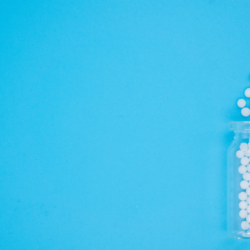In the world of surgery, where 200 million surgeries are carried out every year, patients are often faced with a host of emotions and symptoms, ranging from pre-operative anxiety to post-surgical discomfort. Faced with these challenges,homeopathy offers a gentle, personalised approach to support patients at every stage of their medical journey. By integrating harmoniously with traditional medical protocols, it offers a complementary route to improved convalescence, underlining the importance of holistic health care.
The importance of homeopathic support
Anxiety and anguish are common feelings among patients undergoing surgery. These emotions can lead to physical symptoms such as trembling or a feeling of tightness in the chest. Similarly, the post-operative period can be accompanied by a variety of complaints: pain, bleeding, agitation, bowel problems, intensive fatigue, accumulation of mucus in the bronchi, or persistent headaches after specific procedures.
Faced with these challenges, homeopathy offers targeted solutions aimed at reducing the intensity of these symptoms while promoting a smooth and rapid recovery. This personalised approach takes into account the uniqueness of each patient, offering remedies specific to their individual needs.
Pre-surgery homeopathic preparation
Before surgery, certain homeopathic remedies can be recommended to reduce stress and apprehension. Arnica montana, for example, is often recommended to reduce the risk of bleeding and pain. Other remedies, such as Gelsemium sempervirens, may be prescribed to ease anxiety and nervous tremors.
Post-op homeopathic support
After surgery, homeopathy continues to play an essential role in the healing process. For pain and bleeding, Arnica montana remains a mainstay. For transit disorders, Nux vomica can be useful. For headaches, Belladonna is often recommended, while Bryonia alba can help with bronchial mucus. Each treatment is tailored to the patient’s specific symptoms, making for a more comfortable and effective convalescence.
A personalised approach to homeopathy
One of the major advantages of using homeopathy to prepare for surgery is its ability to offer individualised care. By assessing each patient’s unique symptoms, the practitioner can select the most appropriate remedies, contributing to a faster recovery and better management of post-operative symptoms.
Maximising the effectiveness of pre-surgerycare with homeopathy
Before undergoing surgery, many patients experience feelings of anxiety, fear or stage fright, which can negatively affect their physical and emotional state. Fortunately,homeopathy offers effective solutions to alleviate these pre-operative states, promoting a better surgical experience.
The judicious use of homeopathy as part of pre-operative preparations is an effective strategy for approaching surgery with greater serenity and confidence. By specifically targeting the emotional and physical disorders that may arise before the operation, these homeopathic remedies help to optimise the patient’s overall condition, promoting a faster and less painful recovery and cure.
Mental and physical preparation with homeopathy
Thanks to its gentle, non-invasive approach, homeopathy is an indispensable aid in preparing patients mentally and physically before surgery. Specific remedies are available to help patients overcome fear and anxiety, and to stabilise physical reactions such as tremors.
Arnica montana and phosphorus: a preventive duo
- Arnica Montana 9 CH: Systematically recommended for its ability to reduce fear and prepare the body by minimising the risk of bleeding and post-operative pain. One dose a day for three days before the operation is recommended.
- Phosphorus 9 CH: Used in addition to Arnica for its anxiety-relieving properties. A daily dose is recommended during the same period.
It is important to note that, specifically in the case of dental extraction, it is preferable to limit treatment to Arnica Montana so as not to disrupt the formation of blood clots, which are essential for healing.
Ignatia amara and arsenicum album: For anxiety and restlessness
- Ignatia Amara 9 CH: Ideal for patients experiencing anxiety accompanied by feelings of tightness in the chest and a lump in the throat. Taking 5 granules as often as necessary can offer significant relief.
- Arsenicum Album 9 CH: Recommended for people who are not only afraid of the operation, but also of the hospital environment itself, causing agitation. Taking 5 granules morning and evening is recommended to establish peace of mind.
Gelsemium sempervirens : A solution to tremors
- Gelsemium Sempervirens 9 CH: Specially indicated for patients suffering from anxiety-induced tremor. Repeated doses may help to soothe and calm the anxious subject, contributing to more serene mental preparation before the operation.
Optimising post-surgery convalescence with homeopathy
After surgery, the body undergoes a healing process that can be accompanied by a range of symptoms, from local pain to more generalised problems affecting sleep or digestion.Homeopathy offers targeted solutions to effectively support this recovery period, by acting on the various aspects of convalescence.
The homeopathic approach to post-operative care is distinguished by its ability to offer personalised care tailored to each patient, specifically targeting the symptoms encountered during the convalescence period. By supporting the body’s natural healing process and minimising the discomfort associated with the operation, homeopathy contributes to a faster, more comfortable recovery, enabling patients to regain their well-being and vitality as quickly as possible.
Facilitating expectoration and managing haemorrhage
- Antimonium tartaricum 5 CH: Prescribed to facilitate expectoration of mucus accumulated in the bronchi, often seen after surgery involving the abdominal wall. Taking 5 granules three times a day is recommended to relieve this respiratory discomfort.
- Arnica montana 9 CH and China rubra 9 CH: These remedies are recommended in cases of haemorrhage or following a particularly bloody operation. Administering 5 granules three times a day helps to control bleeding and reduce post-operative pain.
To support digestive function
- Opium 9 CH and Raphanus sativus niger 5 CH: After abdominal surgery, it is crucial to encourage the resumption of digestive transit. These remedies, taken as 5 granules three times a day, help to restore harmonious digestive function.
Limiting post-dental extraction discomfort
- Hypericum perforatum 15 CH: Ideal for reducing pain and discomfort following a dental extraction. Taking 5 granules three times a day is suggested for better pain management.
- Millefolium 5 CH: This remedy helps to control post-extraction haemorrhage, taking 5 granules three times a day.
Boosting energy and overall well-being
- Kalium Phosphoricum 15 CH: For patients experiencing intense fatigue and disturbed sleep after a long operation, this remedy is a source of comfort. A dose in the morning and evening for 15 days helps to restore energy and improve general health.
Soothe post-peridural headaches
- Bryonia alba 7 CH: Bryonia alba, 5 granules three times a day, relieves headaches that may occur after an epidural anaesthetic.
Knowing when to consult a doctor after surgery: Essential advice
After undergoing surgery, it’s crucial to pay attention to your body and recognise the signs that require urgent medical attention. Although post-operative monitoring and homeopathic treatments play an important role in the healing process, there are situations where a doctor’s intervention is essential.
Personalising homeopathic treatment
It is important to stress that the individualised nature of homeopathy requires a precise assessment of each patient to determine the treatment best suited to his or her specific needs. This personalised approach not only ensures optimal preparation and recovery, but also contributes to a more positive and less stressful surgical experience for the patient.
The importance of post-surgery medical follow-up
Regular medical follow-up is essential to ensure optimal recovery. It allows us to monitor the condition of the wound, check that healing is progressing well and detect any complications. It is an essential aspect of convalescence, ensuring that the patient recovers in the best possible conditions.
Situations requiring urgent consultation
Although homeopathy and traditional post-operative care play a crucial role in the healing process, it is essential to be vigilant and to know when to seek urgent medical advice. Recognising the signs of a potential complication and acting quickly can make all the difference to the outcome of your convalescence. Health is precious, and special care during the post-operative period is essential for a full and unhindered recovery.
Severe haemorrhage
Haemorrhage that manifests itself as heavy, continuous bleeding is a major warning sign. This type of bleeding may indicate a post-operative complication that requires immediate attention to avoid potentially serious consequences.
Unbearable pain
Intense, persistent pain that does not subside with prescribed treatment may be a sign of a complication or infection. It is important not to ignore pain that is out of the ordinary and that significantly disrupts your comfort and your ability to recover.
Treatments and pathologies associated with pre- and post-surgery care
After surgery, homeopathy can play an important complementary role in the healing process. Here’s how to use each homeopathic treatment associated with pre- and post-operative care:
Antimonium tartaricum
- Use: Recommended to help expectorate mucus in the event of a productive cough following an operation.
- Dosage: 5 granules of Antimonium Tartaricum 5 CH, three times a day until symptoms improve.
Arnica montana
- Use: Ideal for reducing pain, bruising and swelling. A must for all types of surgery.
- Dosage: 5 granules of Arnica Montana 9 CH, three times a day for the first few days after the operation.
Bryonia alba
- Use: Useful for pain aggravated by the slightest movement. Also effective for post-operative headaches.
- Dosage: 5 granules of Bryonia Alba 7 CH, three times a day until improvement.
China rubra
- Use: Recommended for combating the effects of blood loss and general weakness.
- Dosage: 5 granules of China Rubra 9 CH, three times a day, especially if the operation was marked by haemorrhaging.
Hypericum perforatum
- Use: Indicated for nerve pain or burning sensations following surgery.
- Recommended dosage: 5 granules of Hypericum Perforatum 15 CH, three times a day, particularly after dental work or surgery involving the nerves.
Millefolium
- Use: Used to reduce post-operative haemorrhage.
- Dosage: 5 granules of Millefolium 5 CH, three times a day, in case of bleeding.
Opium
- Use: Recommended to stimulate intestinal transit, particularly after abdominal surgery.
- Dosage: 5 granules of Opium 9 CH, three times a day until normal bowel function is restored.
Phosphorus
- Use: Useful in cases of pre-operative anxiety and post-operative nosebleeds.
- Dosage: 5 granules of Phosphorus 9 CH, once a day, a few days before and after the operation.
Raphanus sativus niger
- Use: Helps to relaunch transit in cases of bloating and absence of postoperative gas.
- Recommended dosage: 5 granules of Raphanus Sativus Niger 5 CH, three times a day until improvement.
Staphysagria
- Use: Ideal for surgical cuts which do not heal properly or post-operative pain such as after a caesarean section or circumcision.
- Dosage: 5 granules of Staphysagria 9 CH, three times a day for a few days following the operation.
These homeopathic remedies are frequently used to alleviate various post-operative symptoms, such as pain, haemorrhage or transit disorders. They contribute to a more comfortable convalescence and faster recovery.
Associated pathologies
- Anxiety
- Hyperalgesia (increased sensitivity to pain)
- Haemorrhage
- Insomnia
These pathologies may arise or be exacerbated in the post-operative context. Their management is often an integral part of the care plan, to ensure a smooth and effective recovery.





